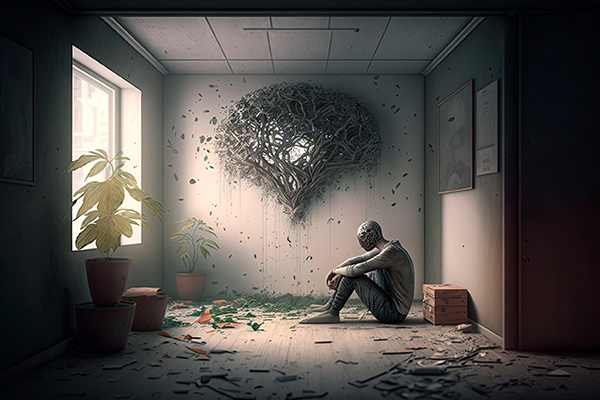self-mastery
Karmic Healing: Can You Handle The Truth?
 In the famous courtroom drama A Few Good Men, Jack Nicholson’s character, Colonel Jessup, exclaims in an iconic movie moment, “You can’t handle the truth!”
In the famous courtroom drama A Few Good Men, Jack Nicholson’s character, Colonel Jessup, exclaims in an iconic movie moment, “You can’t handle the truth!”
I suspect this scene has become legendary in movie history because it resonates so deeply with most people. On some level, many of us sometimes struggle to face the truth about ourselves and our lives.
Whether it’s difficult memories, unhealed wounds, failed relationships, or unspoken regrets, facing our truth can be challenging, even traumatic or overwhelming.
Yet, from a spiritual perspective, facing and owning our truth is one of the most powerful steps we can take on our path to karmic healing and soul growth.
Our soul journey is a karmic balancing act in which the energy we put out into the world eventually comes back to us. When we hide from our truth – whether through denial, justification or avoidance – we accumulate karmic debt.
Like a heavy boulder that we carrry around, karmic debt hinders our soul growth and spiritual progress. On the other hand, when we consciously choose to face our truth, we release this burden and open ourselves to healing, growth, fulfillment and inner peace.
Denial is our most common response to unpleasant truths. We tend to avoid acknowledging aspects of ourselves that we find unattractive, justify our negative behaviors, and make excuses for our bad choices and failures in order to protect our fragile human egos. However, these “untruths” build up over time. By avoiding them, we create layers of illusion that distance us from who we really are and cloud our understanding of our soul purpose and the divine spark within.
Embrace Who You Are And Shine Your Light!
 We all come to this planet with our own unique gifts. Just as no one on this planet has the same fingerprint as you, no one has your unique personality, talents and life purpose. Sure, some of us may look alike, but our soul essence and life purpose is completely unique from one person to the next.
We all come to this planet with our own unique gifts. Just as no one on this planet has the same fingerprint as you, no one has your unique personality, talents and life purpose. Sure, some of us may look alike, but our soul essence and life purpose is completely unique from one person to the next.
And in a world that often emphasizes conformity and sameness, it’s also important to remember this spiritual truth: Your uniqueness is not a quirk; it’s your superpower!
I often feel sad when I see young people on social media copying each other or trying to be just like everyone else. Of course, they want to fit in and be accepted, and they fear being rejected by their peers. Unfortunately, this struggle is not limited to the younger generation. It seems that many adults are also caught up in the senseless hamster wheel of imitation and keeping up with the Joneses.
I once asked a girl who was imitating her friend why she wanted to be a copy of someone else. I reminded her, “You are gifted and a very talented artist. At first she was taken aback, but after a few moments I felt a spark of understanding in her. Then she looked at me and said, “Oh my God, you’re so right!” She, like so many others, needed a reminder of her inherent worth and unique individuality.
Each of us comes to this planet to share our special light in our own unique way. If more children were told from a young age how special they are and had their gifts nurtured by their parents and teachers, perhaps we would live in a much safer, happier and more compassionate world. Instead, I see so many folks yearning to fit in rather than embracing their individual paths and personal gifts.
Tarot Forecast November 2024: King Of Pentacles
 The card I drew for this month is the King of Pentacles, which predicts a time of stability, abundance, and grounded success. This card is associated with material wealth, financial security, and mastery of the physical realm. It signals that now is the time to use your practical wisdom and focus on tangible results.
The card I drew for this month is the King of Pentacles, which predicts a time of stability, abundance, and grounded success. This card is associated with material wealth, financial security, and mastery of the physical realm. It signals that now is the time to use your practical wisdom and focus on tangible results.
Whether we’re building a business, investing in a new opportunity, or seeking a stable foundation, the King of Pentacles reminds us that patience, diligence, and careful planning are the keys to long-term success.
The imagery of the King of Pentacles is rich in symbolism. Sitting on an elaborate throne decorated with carvings of bulls and vines, he is a figure of authority and strength closely associated with the earth element. The grapes and lush greenery surrounding him symbolize fertility, prosperity and the fruits of hard work.
In his hand he holds a golden pentacle coin, representing mastery over the material world and the ability to turn dreams into reality. His robes are embroidered with images of grapes and vines, further reinforcing the themes of abundance and material growth.
The king’s pragmatic energy of self-mastery suggests that this November will not be a time for reckless actions or impulsive decisions. Instead, it’s about making strategic moves with confidence and a long-term perspective.
The symbolism of this card also encourages embracing a provider role – whether in business, family or community – as the King of Pentacles is a generous benefactor and pragmatic leader who shares his wealth and success with others.
Unstuck Your Life By Transmuting Your Origin Story
 Do you feel that no matter what you do, your life experiences seem to be stuck on repeat? Are you living the same scenario over and over with a different cast of characters? Or maybe even the same cast, but going through the same problems over and over with no change? If any of this sounds familiar, you may need to revise your origin story.
Do you feel that no matter what you do, your life experiences seem to be stuck on repeat? Are you living the same scenario over and over with a different cast of characters? Or maybe even the same cast, but going through the same problems over and over with no change? If any of this sounds familiar, you may need to revise your origin story.
We all have an origin story. It is a set of deeply held ideas and beliefs that shapes how we see ourselves and our place in the world. It is the story of that we constantly repeat when we talk about ourselves or think about our life experiences. Internally, we use it to define ourselves, and externally, we use it to present ourselves to others.
Our story of origin comes from family, early life experiences, and the choices we made about ourselves as we grew up. While it helps define us, it can also become a prison, limiting our growth and repeating unsatisfying patterns in what we manifest.
In my work as a psychic consultant, I often find in readings that many people are held back by their origin story without even realizing it. When we hold on too tightly to our chosen narrative, we become trapped in cycles that prevent us from evolving into the version of ourselves we truly want and deserve to be.
An origin story differs from a limiting belief in that it is more about the construction of our identity and personality – who we are and how we want to be in the world. It can be more difficult to identify and deconstruct because it is such a strong part of our personal identity. However, it is similar to limiting beliefs in that it is important to explore and become aware of it because it can hold us back and create very unsatisfying life experiences.
How To Embrace Your Shadow Self
 Most people tend to shy away from acknowledging their dark or “shadow” side when it comes to spirituality.
Most people tend to shy away from acknowledging their dark or “shadow” side when it comes to spirituality.
In fact, the tendency to avoid the uncomfortable aspects of the self is due in large part to our religious or spiritual background. Throughout history, most traditions have encouraged people to suppress, deny, or transcend their human flaws and shortcomings in favor of higher ideals such as purity, salvation, or enlightenment.
This reluctance to face the shadow within continues to this day, with modern spiritual and metaphysical communities often favoring light, love, and positivity while largely ignoring the messy, difficult, and painful aspects of the human experience.
But by avoiding the shadow within, we deny ourselves the opportunity for a deeper understanding of our soul’s purpose and untapped possibilities for personal and spiritual growth.
According to Carl Jung, the famous Swiss psychiatrist who pioneered the concept of the “shadow” in psychology, “one is not enlightened by imagining figures of light, but by making the darkness conscious.” Enlightenment isn’t about avoiding the shadow. Instead, it’s about facing it and integrating it into our being.
When we face the shadow within, we reclaim parts of ourselves that hold immense power, creativity, and insight. By delving into the deeper truths of our shadow selves, we can unravel the unconscious patterns that dictate our lives, allowing for true healing, transformation, and enlightenment.
Are You On The Karmic Path Of Grace?
 Every step we take in life shapes not only how we feel, but also where we end up in life and how others respond to us.
Every step we take in life shapes not only how we feel, but also where we end up in life and how others respond to us.
Sayings such as “you reap what you sow,” “what goes around comes around,” and “your vibe attracts your tribe” represent the complex interplay between our choices and actions and the reality we experience each day.
This is known as the universal law of cause and effect, also known as the spiritual principle of karma. Every choice we make has consequences, whether seen or unseen. Every action we take – whether physical, mental, emotional or spiritual – has a corresponding result or consequence.
Nothing in life happens by accident. Our values, beliefs, mindset and attitude all help to shape our life path and destiny. Our choices, behaviors, and even our thoughts have a ripple effect. Our free will choices ultimately determine our life journey and the legacy we will someday leave behind.
In essence, the energy or intent behind our actions affects the results we experience in life. Positive actions attract positive results, while negative actions can lead to challenges or difficulties. Over time, the cumulative effect of these causes and their consequences determines the course of our lives, affecting relationships, opportunities, and personal growth.
For this reason, it is essential that we be mindful of everything we say and do. We must cultivate self-awareness and take personal responsibility because every step we take affects our future and our destiny.
